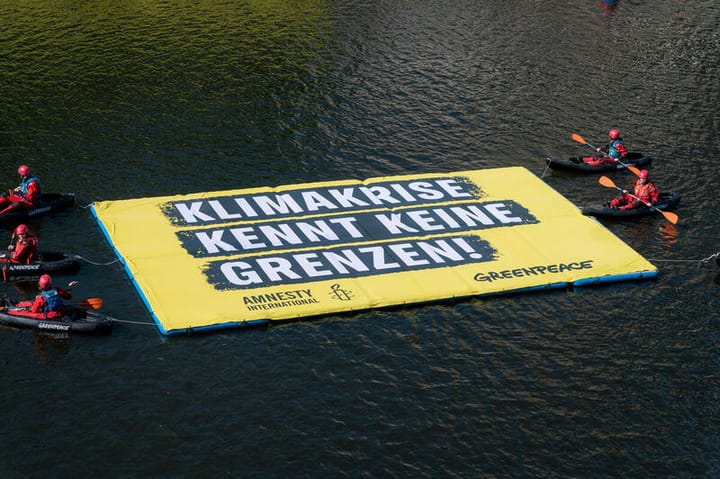An ocean of opportunities? Climate litigation is doing so well it’s now being eyed by investors

Investors are increasingly looking at climate lawsuits as a source of revenue. Why is that important, how does it work and are there any downsides?
Imagine you’re trying to get compensation for water damage to your coastal home, caused by rising sea levels and flooding made much more likely by climate change. You hire a lawyer to file a claim, who thinks you have a good chance of winning, but since you don’t have much money they find an investor to cover the legal costs.
Litigation finance, where a third party funds a lawsuit on the understanding that they’ll get a cut if it wins, is a widespread practice used in everything from personal injury claims to commercial disputes. It’s lucrative and it’s on the rise.
Investors tend to back lawsuits in countries where the legal system is welcoming to class action claims and where the (potentially huge) costs of bringing a case can be recouped by the winner, says Dr Geert van Calster, a lawyer and professor of law at Katholieke Universiteit Leuven and visiting professor at Monash University. The Netherlands, UK, Australia and the US are particularly flush with this kind of cash.
Pogust Goodhead is a law firm specialising in big collective action claims against organisations that mistreat, mislead or injure people, often with a human rights, product liability or environmental element.
After it filed a landmark claim in the UK for compensation against mining firm BHP on behalf of victims of the Mariana dam disaster in Brazil, the company received £150 million from North Wall Capital so that it could take on more high-profile cases.
“Parties with funds to access the courts.. they always existed and they will always happen,” says Ana Carolina Salomão, partner and head of litigation finance at Pogust Goodhead. “The difference with what's happening now is that some investment firms have now the appetite to run the financial risks related to funding a lawsuit. This opens a vast ocean of opportunities for those that have their rights abused.”
"The house is burning and now you're taking out insurance"
How does it work? Thomas Kohlmeier, co-founder and co-CEO of Nivalion, which advises litigation funding investors, describes it as a backwards form of insurance. “You pay a premium and if the house should burn down the insurance pays for a new house and this is why you pay a premium annually. The difference with litigation funders is the house is burning and now you're taking out insurance.”
Regulation of this niche sector varies around the world, but typically the law firm and investors draw up a contract and agree to a slice of the compensation if the lawsuit wins. The funder is kept up to date with how the lawsuit is going but not allowed to interfere. For Salomão it is a full-time job seeking out and working with funders to meet local laws, making sure everyone understands the implications, and spreading out the risks of different kinds of claims.
Third-party funding can theoretically be used for any kind of lawsuit, but investors often have their own rules on what kinds of cases and risks they will accept. Kohlmeier tells The Wave that Nivalion refused to lend money to a lawsuit by a coal mining company suing a government because they got their licence revoked. “From a legal perspective that case looked at first glance meritorious, but nevertheless we declined. Most serious funders have these kinds of guidelines.”
As well as considering jurisdictions and the kind of lawsuit being brought, investors want cases that stand a good chance of winning. And they are increasingly interested in environmental and social issues.
Most climate litigation to date has been against public authorities or seeking remedial action, which isn’t attractive to third-party funders. But litigants are increasingly seeking financial payouts from fossil fuel companies and other polluting industries for the impacts of the climate crisis, for greenwashing or for damaging their investments. This week, four residents of the Indonesian island Pari took Swiss cement firm Holcim to court demanding compensation for climate damages and a financial contribution to flood protection measures, as well as a swift cut to the company's CO2 emissions.
Peruvian farmer Saúl Luciano Lliuya’s attempt to get RWE to pay for flood defences in his hometown in particular is expected to lead to its own flood of similar claims if it succeeds. “Funders typically try to fund tried and tested legal concepts with lots of precedent,” says Kohlmeier.
And some legal, regulatory and political institutions are looking sympathetic to such claims. Last year, for example, the UN said Australia should compensate Torres Strait Islanders for failing to deal with the climate crisis.
Lawyers are also bracing for an increase in ESG-related lawsuits, Bloomberg found, as corporate disclosure requirements stiffen around the world. And, according to Litigation Finance Journal, litigation funders like Woodsford and Therium are particularly keen to target capital towards such cases.
Another funder, Aristata Capital, was founded by Rob Ryan who was previously director of business development of litigious environmental law firm ClientEarth. Ryan told Funds Europe that “private capital is needed to solve public problems” and is now keen to show that ESG-related cases can be a profitable investment.
Speaking at a conference in November organised by City and Financial Global, Dr Benjamin Franta, head of the Climate Litigation Lab at the Oxford Sustainable Law Programme, said for-profit climate litigation was now starting to be seen in jurisdictions where monetary damages or civil penalties could be levied and described it as “a huge game changer”.
The ick-factor
The idea of third party funding raises some hackles.
The US Chamber of Commerce has for years vociferously tried to require disclosure of litigation backers (with some success) ostensibly on the grounds that a lack of transparency opens the courts up to spurious claims.
And those outside the legal profession can be uncomfortable with the way this form of funding works. A recent poll by communications consultancy Portland, which does PR for companies, businesses and governments facing legal disputes, found lots of appetite in the UK to join class action cases - particularly environmental ones - but only around half of respondents were comfortable with investors taking a cut of the eventual payout and two thirds would not join a claim financed by an unknown funder.
Even Litigation Finance Journal describes the notion that a plaintiff might sell a stake in their lawsuit to a third party as feeling “a bit icky” for a lot of people.
In Kohlmeier’s view there are serious reputational risks in funding cases like this “because you don't want to be the funder who is taking away money out of a good case”.
He describes a medical malpractice case he was once involved in funding, which involved the severe birth injuries of a baby whose parents sued their insurance company to cover the care costs. “It's probably the cruellest case I've seen in my career. We funded the case, held the insurance company liable. And then of course we got our risk premium, which was already lower than normal, and nevertheless we had to defend ourselves because the parents said ‘Look, these greedy bastards - they're walking away with 20%’. "
Kohlmeier says he still has every sympathy for the parents who tried to do the best for their child, but would rather not find himself in such a situation again.
Salomão puts the discomfort down to a lack of public understanding about litigation finance and how it works, and thinks this has to be challenged. She stresses that funders want a return on their investment, which means claims without any merit are unlikely, and points to the lack of climate litigation at Pogust Goodhead to date to prove this point: “If I'm struggling to see the causation, and I think that there isn't enough evidence, how will I be able to find a party to bet on it and to put their money at risk?”
"It's not beneficial for the big polluters that people now have ways to seek redress"
She is also frustrated by the suggestion that lawyers working on contingent fee rates are ‘ambulance chasers’.
“This argument is pure lobby from the corporations themselves and from the Chambers of Commerce,” says Salomão. She notes that most legal services are for-profit and questions why people find it easier to understand corporations seeking funding to pay for their legal fees to litigate over a broken deal. "Why are people so stressed when people living below the poverty line in south-east Asia or Brazil or in Africa gather together with whatever funds to seek redress, to seek justice?
“Why am I saying that there is a lot of lobby on that? Because it's not beneficial for the big polluters that people now have ways to seek redress.”
There's also a wider question of whether litigation funding exacerabates existing inequalities.
Lawyers that use litigation funding are adamant that it makes it easier for victims to access justice. Dr van Calster was part of the legal team that managed to convince judges that the $6bn case against BHP could be heard in a UK court. “That case clearly is commercially funded, and it would have never been in England if it weren't for that funding,” he says.
That said, it can’t be the only source of revenue, because investors will not back every case in every country and they’re unlikely to back novel claims with uncertain outcomes - which many climate cases still are.
Instead, this kind of litigation will have to continue to rely on some combination of NGO or philanthropic backing, crowdfunding and pro bono legal support. Andrej Nosko, co-executive director of non-profit PILNet, which connects NGOs with lawyers offering free advice, wants to boost awareness of these sources and improve wider understanding of legal issues. “There is a lot of opportunity in using the law in creative ways,” he says.
In some countries, the state will even fund certain public interest cases. Litigation funds like these exist in New Zealand, parts of Canada, and are being considered elsewhere.
“You will not be able to finance all potential cases that have legal merit, ethical merit, political merit,” says Dr van Calster. But having a successful claim in an intricate, difficult, trailblazing kind of case “might convince other parties to settle when a claim is being suggested”. And it might pave the way for easier and less risky future claims, which funders are much more interested in.
To date, says Dr van Calster, almost all decisions to fund climate litigation have been the result of a conscious and careful decision by an investor. But in future he thinks it will be just another category alongside lawsuits on white goods. “Depending clearly on how successful these cases will be, we might get there within the next two or three years.”
Correction: This article was amended to clarify that the baby mentioned as the subject of a lawsuit did not die, but suffered serious injuries during birth.



